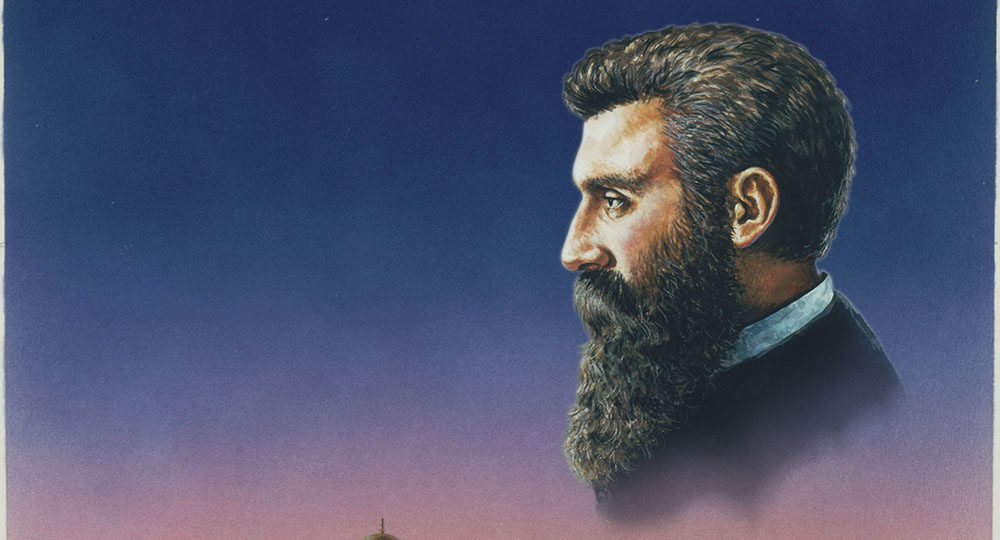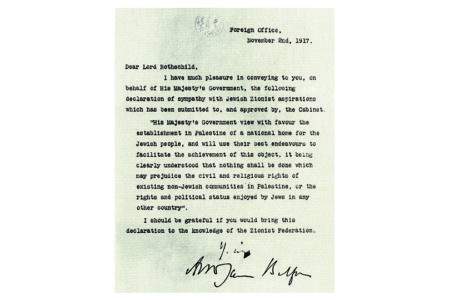Herzl’s Dream
Theodor Herzl had a dream. It was a dream born of the desire of the Jewish people to have a homeland in Eretz Israel under the recognition of international law. Herzl said of his plan to carve a Jewish state out of the depleted soil of the Middle East, “If you will it, it is no dream.”
On May 15, 1948, the world awoke to find that Herzl’s dream had become a national reality. Since that day, neither Herzl’s dream nor the history of humanity has been the same. Herzl’s dream would often seem more like a nightmare, and the world has never quite figured out just what to do with the State of Israel and its people.
Another Voice
While the dream of Herzl and his early Zionist contemporaries was shared by a significant number of influential people outside the world of the Jews, there was one voice behind the scenes that was, in reality, directing events.
In spite of the fact that the Scriptures were being discredited in Europe among mainline Protestants, there was a restlessness developing among Jews that caused many of them to begin looking toward their ancient land. The Word of God had made definitive promises regarding the eventual return of the Jewish people to their homeland. One such promise is found in Ezekiel 36:24:
For I will take you from among the nations,
and gather you out of all countries, and will
bring you into your own land.
The contemporary wonder that is Israel speaks clearly to the fact that, regardless of religious trends or political opinions to the contrary, God’s Word will prevail, and what He says, He will most assuredly do. This is a fact that must always be kept in focus today, because contrary winds are blowing hard against little Israel. They are also buffeting those friends, namely Bible-believing Christians, who have stood with the Jewish people across the years.
The Final Chapter Is Not Yet Written
In these terrible days of shattered dreams, broken hearts, and the virtually constant distress of the nation, it is imperative not to interpret Israel’s present state, nor indeed her future, through the eye of the public media.
I was in Israel when two of the suicide bus bombings were carried out: one in Jerusalem, the other in Ashkelon. It is impossible to describe either the horror at the scene or the wounds that are inflicted on the hearts of everyone touched by such disasters. It is as though the entire nation is driven, en masse, to the Wailing Wall to sob incoherently for relief that seems nowhere to be found. The cold fact is that, if Israel’s enemies are not dealt a devastating blow by other nations united for the sake of sanity, terror will continue to rip at Israel and reach beyond to assail other nations as well—namely the United States of America.
In the midst of such somber reflections, a question is taking shape. It is being asked inside and outside of Israel by some people who see that, given the probability—which is almost certain—the terrorists will continue to strike at Israel, Can the nation survive?
Quite recently, Yasser Arafat—whom you will remember as the man who picked up a Nobel Peace Prize a few years ago—described his formula for the eventual annihilation of the Jewish state. On that occasion, he delivered a speech in Arabic to a group of Arab diplomats at a meeting held in Stockholm, at Sweden’s Grand Hotel. As sometimes happens to the chairman when he is speaking in Arabic, he seems to forget himself. Evidently he does not realize that there are others, non-Arabs, who also understand the Arabic language. In remarks entitled “The Impending Collapse of Israel,” Arafat is quoted to have said,
We Palestinians will take over everything, including all of Jerusalem…We of the PLO will now concentrate all our efforts on splitting Israel psychologically into two camps. Within five years, we will have six to seven million Arabs living on the West Bank and in Jerusalem…We will make life unbearable for Jews by psychological warfare and population explosion; Jews won’t want to live among us Arabs.
When Israel’s much-defended “peace partner” utters such statements, we wonder why the media and Western leaders, or Israelis for that matter, do not immediately express outrage and demand that he be held accountable for his Jihad-driven ramblings. Whatever the reasons for the West allowing him to continue to make such inflammatory statements, he continues to tell the world that he will eventually see debris from the State of Israel floating somewhere in the Mediterranean. We understand that this desire is nothing new. Such hopes have been expressed by purveyors of evil since Abraham was converted or, I might say, created as the original Hebrew. As the millennia roll by, Abraham’s heirs are still with us and are most certainly being heard from.
In spite of some understandable hand-wringing, Israel will survive!
From the human side of things, many Israelis cling to the very lucid idea that they have no other choice. With anti-Semitism becoming a resurgent force across the face of the Gentile nations, there are few havens left open to the possibility of massive infusions of Jewish refugees. Other Israelis rightly stand up to tell their satanically charged adversaries and the rest of the world that they have a right to their homeland—and there is no bomb big enough to dislodge them from that land.
Israel, in spite of present and future hardships, will survive. How can we be so confident? Because the matter is in higher hands than those of human leaders, fanatical destroyers, or any human agents. There is a promise from God.
The Optimists
Think back for a moment to the times in the history of the modern State of Israel when the visage of extinction seemed to hang over the nation. Taken a step further, how many times has it seemed probable that the Jewish people would cease to exist? A staple of world history seems to be the picture of the Jews and/or their nation hanging by their fingernails with conventional wisdom saying that they couldn’t hang on much longer.
But they still are here, and the certainty is that they will be with us when all of their enemies have gone on to what they richly deserve.
There are those who will bridle at such an outpouring of optimism. In the case of Israel and her Jewish sons and daughters, in spite of all that has befallen them, they have always been surrounded by a significant host of incurable optimists. Strange as it may seem to some, those optimists have always been correct—and for good reasons.
It’s in the Book
The optimists are not merely those who dream. They are people who firmly believe what the Book has to say about the People of the Book. Optimists—in the case of Israel and her people—are those who believe what the Bible has to say on the subject of a Jewish homeland.
To some this may seem simplistic and perhaps even a bit naive. But let’s put it to the test. For more than three thousand years, history has demonstrated a disposition to align itself with what the Scriptures have to say about the course and destiny of the Jewish people. It is an inescapable fact of life. Thus, for those who wish to talk of odds and probabilities, the safe decision is to believe what the Book has to say.
What does it say about these amazing people and their undying land?
There Will Always Be an Israel
In the throes of Israel’s current dilemma, it is easy to forget the tenacity of the divine promises assuring the preservation of the nation. These promises are a fact at least casually known to most evangelicals. However, in the heat of the hatred being vented toward the people of Israel, this truth tends to become somewhat fragile in many minds.
“And yet for all that [failing the Lord], when they are in the land of their enemies, I will not cast them away, neither will I abhor them, to destroy them utterly, and to break my covenant with them; for I am the Lord their God” (Lev. 26:44).
The essence of this emphatic message is seen over and over again throughout the Word of God. Here is God’s irrevocable guarantee of Israel’s survival. History has placed an indelible exclamation point behind His declaration. The Jews have survived.
In spite of Israel’s failures, they will not be utterly forsaken. They will not be destroyed. They will not lose their covenant promises. They will not be removed from the heart of a caring God.
Bible-believing Christians understand the principle clearly; we live it every day. Jesus has said, “I will never leave thee, nor forsake thee” (Heb. 13:5). While there is often much dark water to cross, the promise holds firm. It is as demonstrable as the historical testimony of God’s unfailing preservation of Israel.
The Best is Yet to Come
Amid all of the bad news that seems to be immersing Israel and much of our planet these days, let’s pause to remember that—very soon, we hope—a much better day will come. Although Israel does face a last-days time of travail, the promises of the future outweigh by far any passing agony that might fall upon the nation. It is on this that the emphasis should be kept.
In every serious illness I have ever been forced to endure, the most compelling thought that filled my mind was of the day when the suffering would pass and I would be well again. I can say with certainty that I speak for most people in this.
So it is with Israel, and we believers will all share in the glow of their coming glory.
“And I will put my Spirit within you, and cause you to walk in my statutes, and ye shall keep mine ordinances, and do them. And ye shall dwell in the land that I gave to your fathers; and ye shall be my people, and I will be your God” (Ezek. 36:27–28).
The dream of the early Zionists, whether they fully realized it or not, was a step in this direction. Their desire was to return to the Holy Land. In itself, however, that is not enough. Zevulun Hammer, Israel’s Minister of Religious Affairs, said some time ago: “We cannot have a Holy Land, without a holy people.”
His is precisely the point. God is in the process of bringing into being a nation that is wholly reconciled to the Messiah. Then all that He has promised will come to pass.
We can draw an analogy between Israel’s present situation and that of Jesus’ disciples two thousand years ago. When the tide of popularity seemed to be running against their Lord, He asked them if they, like the multitudes, would look in another direction for a deliverer. Peter answered, “Lord, to whom shall we go? Thou hast the words of eternal life. And we believe and are sure that thou art that Christ, the Son of the living God” (Jn. 6:68–69).
For Israel, like the disciples of Jesus, deliverance can never be complete in an “ism.” The ultimate answer is found in the only solution He has provided—the one who came to fulfill Isaiah 53, the one who has promised to come again and set things right.







